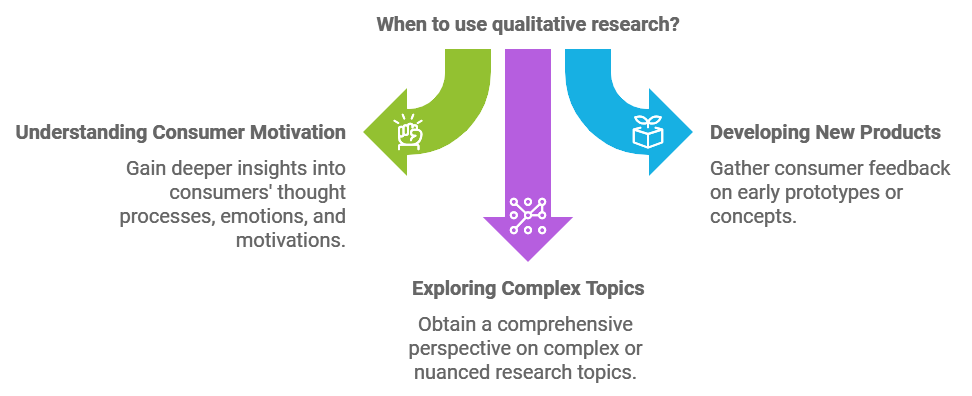When to Use Qualitative Research?

Qualitative research is ideal for gaining an in-depth understanding of consumer behaviors, motivations, and experiences.
Why choose qualitative research over other research methods? Understanding when to use qualitative research can help businesses and researchers uncover more profound, more nuanced insights.
Exploring the Value of Qualitative Research
Qualitative research is a powerful tool for understanding consumer behavior, attitudes, and experiences. Unlike quantitative research, which focuses on numerical data and statistical analysis, qualitative research seeks to uncover individuals’ motivations and perspectives.
When to Use Qualitative Research
Knowing when to use qualitative research is essential for maximizing its benefits. There are specific scenarios where qualitative research is the most valuable approach, allowing researchers to gather insights that may not be captured through quantitative methods alone.

- Understanding Consumer Motivation: Qualitative research is ideal for exploring why consumers make certain decisions. Using interviews or focus groups, researchers can gain deeper insight into consumers’ thought processes, emotions, and motivations behind their actions.
- Developing New Products: When developing new products or services, qualitative research helps gather consumer feedback on early prototypes or concepts. This approach allows companies to understand consumer needs and preferences before moving to larger-scale production.
- Exploring Complex Topics: When a research topic is complex or requires a nuanced understanding, qualitative methods such as in-depth interviews or ethnographic studies can provide a more comprehensive perspective than a survey.
The Advantages of Qualitative Research Over Quantitative Methods
Qualitative research provides several unique advantages over quantitative research methods, making it the preferred choice in certain situations.
- Depth of Understanding: Unlike quantitative surveys that collect numerical data, qualitative research provides rich, detailed insights. Researchers can explore participants’ thoughts, emotions, and experiences through interviews, focus groups, and case studies.
- Flexibility: Qualitative research is more flexible compared to structured quantitative methods. Researchers can adapt questions and approaches during the study to explore new areas of interest as they arise.
- Consumer Perspective: Qualitative research focuses on understanding the consumer’s point of view. This makes it particularly valuable when understanding complex behavior patterns, emotions, or attitudes.
When Not to Use Qualitative Research
While qualitative research has many advantages, it may not be the most effective approach.
- Large-Scale Generalizations: Quantitative research is more suitable if the research aims to gather statistically valid data that can be generalized across a large population. Qualitative research typically involves smaller sample sizes, which limits the ability to make broad generalizations.
- Measuring Numerical Metrics: When numerical data such as market share, sales figures, or customer ratings are needed, quantitative methods are better suited to provide measurable and statistically valid results.
- Time and Cost Constraints: Qualitative research, such as in-depth interviews or ethnographic studies, can be time-consuming and expensive. Quantitative surveys may be more appropriate when quick, cost-effective data collection is needed.
Combining Qualitative and Quantitative Research

Combining qualitative and quantitative methods can offer comprehensive insights for many research projects. Both approaches allow researchers to validate qualitative insights with quantitative data, providing a holistic view of the research problem.
- Complementary Insights: Qualitative research can provide in-depth insights into consumer attitudes, which can then be validated with quantitative surveys. This approach ensures that both the depth and breadth of consumer perspectives are captured.
- Sequential Methodology: Researchers often start with qualitative research to explore a topic in-depth, followed by quantitative research to test and validate findings across a larger sample. This sequential approach maximizes the strengths of both methodologies.
Challenges of Conducting Qualitative Research
Qualitative research is a valuable tool but comes with particular challenges that researchers must be prepared to address.
- Subjectivity: Qualitative research relies heavily on the researcher’s interpretations, which can introduce bias. Ensuring objectivity and minimizing bias requires careful planning and a clear research framework.
- Small Sample Size: Qualitative research typically involves fewer participants, which may limit the generalizability of the findings. Researchers must clearly define the purpose of the study and acknowledge the limitations in terms of sample size.
- Time-Consuming Nature: Conducting interviews, transcribing data, and analyzing qualitative information can be lengthy. Researchers must plan accordingly to ensure sufficient time to gather and analyze data effectively.
Qualitative Research for Product Development and Innovation
Qualitative research is essential in product development, particularly during the ideation and concept testing phases. By engaging with consumers early in development, companies can create products that meet real consumer needs and preferences.
- Consumer Feedback on Prototypes: Qualitative research allows for gathering feedback on product prototypes, enabling companies to make iterative improvements before investing in full-scale production.
- Exploring Unmet Needs: Through interviews and focus groups, researchers can explore consumer pain points and identify unmet needs, which can inspire new product innovations.
- Creative Co-Creation: Qualitative research can involve consumers in the co-creation of products, allowing for a collaborative approach that incorporates consumer perspectives directly into product design.
Using Qualitative Research to Understand Cultural Context

Understanding the cultural context in which a product or service is used is critical for effective marketing and product development. Qualitative research methods such as ethnography provide insights into the cultural factors influencing consumer behavior.
- Ethnographic Studies: By observing consumers in their natural environments, researchers can understand the cultural norms, values, and behaviors that shape consumer decisions.
- Cultural Adaptation of Products: Qualitative research helps identify cultural differences that may impact product adoption, enabling companies to adapt their offerings for different markets.
- Marketing Campaign Localization: Understanding cultural nuances is essential for developing campaigns that resonate with specific target audiences. Qualitative research provides the insights needed to create culturally relevant messaging.
What Makes SIS International Research the TOP Market Research Firm for Qualitative Research
SIS International Research is a leader in providing market insights through qualitative research. Our comprehensive research capabilities, industry expertise, and forward-thinking approach ensure our clients have the knowledge they need to succeed in today’s competitive market. Here’s how we help:
- Expert Knowledge of Qualitative Research Methods:
SIS has extensive expertise in conducting qualitative research, including focus groups, in-depth interviews, and ethnographic studies. - Customized Research Solutions:
We tailor our research solutions to meet our clients’ specific needs. Whether it’s understanding consumer motivations, exploring new product concepts, or analyzing brand perception, our customized research helps clients stay ahead of the competition. - Comprehensive Analysis:
At SIS International Research, we provide a holistic analysis of consumer behavior by leveraging our extensive industry network and connections. - Partnership with Industry Leaders:
We collaborate closely with leading companies across industries to provide our clients with firsthand insights into the latest developments in consumer preferences. These partnerships ensure that our clients receive the most up-to-date and relevant information. - Data-Driven Insights for Informed Decision-Making:
We utilize cutting-edge data analytics tools to provide our clients with actionable insights, allowing them to make informed decisions about product development, marketing, and strategic investments. - Commitment to Quality and Innovation:
Our commitment to quality and innovation sets us apart. We focus on helping clients develop products and strategies that resonate with consumers, address their primary concerns, and build trust in their offerings. - Trend Forecasting and Strategic Planning:
Our expertise in trend forecasting helps clients anticipate changes in consumer preferences, ensuring they are well-prepared for the future. - Proven Track Record:
SIS International Research has a track record of success, having helped shape the strategies of leading companies. Our research has been instrumental in driving successful product launches and informing strategic decisions, making us the go-to partner for market insights on when to use qualitative research.
About SIS International
SIS International offers Quantitative, Qualitative, and Strategy Research. We provide data, tools, strategies, reports, and insights for decision-making. We also conduct interviews, surveys, focus groups, and other Market Research methods and approaches. Contact us for your next Market Research project.


